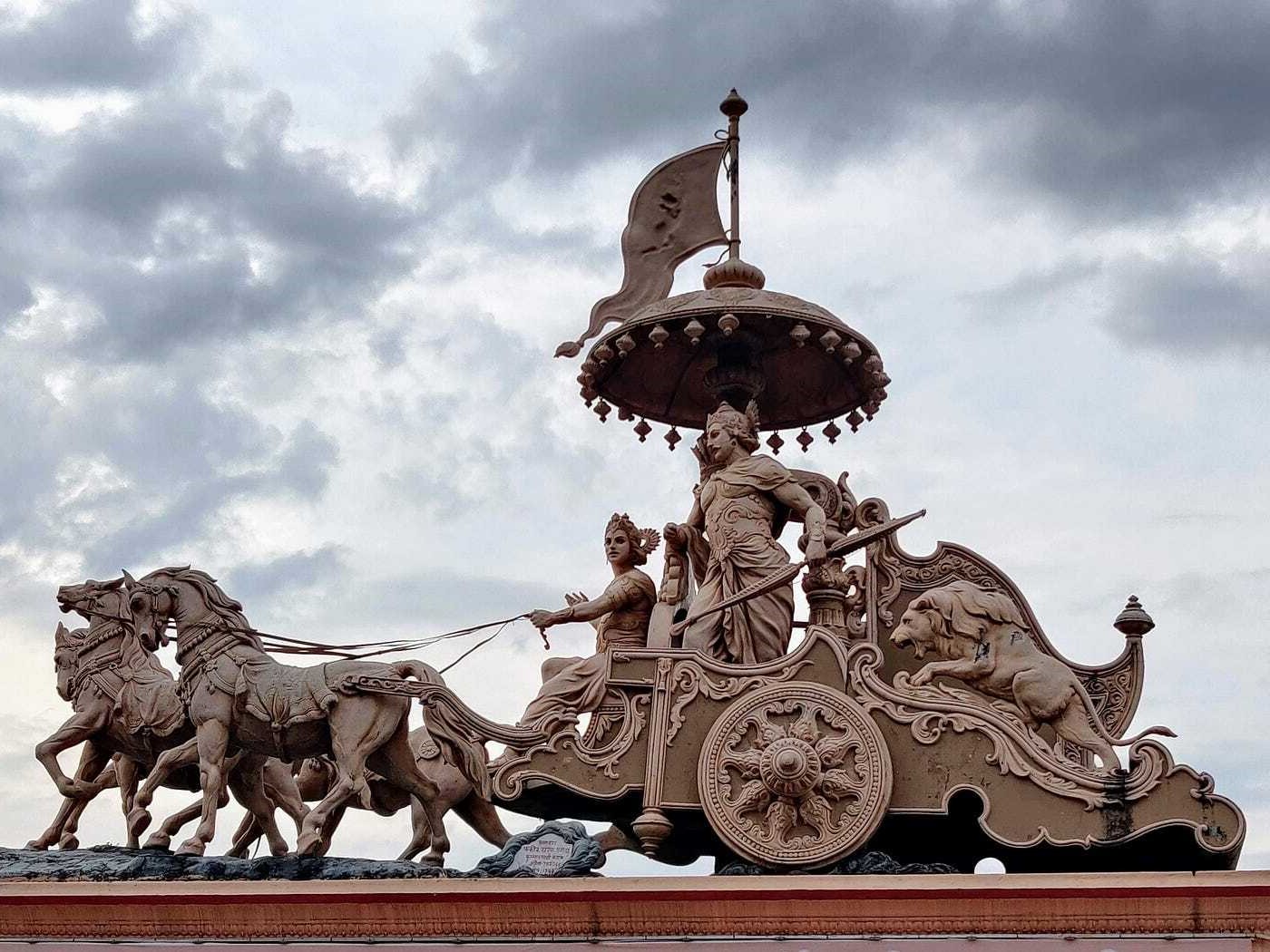
Mahabharata, an epic narrative of ancient India, holds a treasure trove of stories, characters, and lessons that have fascinated readers and scholars for centuries. This colossal epic, revered for its complexity and depth, offers more than just a tale of war and righteousness; it delves into the intricacies of human nature, dharma (duty/ethics), and the eternal quest for truth. Whether you're a history buff, a lover of mythology, or simply curious, these 50 facts about the Mahabharata will take you on a captivating ride through ancient battles, timeless wisdom, and intriguing tales that have shaped Indian culture and beyond. From its vast array of characters to the profound philosophical discussions, prepare to be amazed by the richness and diversity of this ancient masterpiece.
The Epic Mahabharata
The Mahabharata is one of the longest epic poems in the world. It tells the story of the Kurukshetra War and the fates of the Kaurava and Pandava princes. Here are some fascinating facts about this ancient Indian epic.
- The Mahabharata consists of approximately 100,000 shlokas or verses, making it about seven times the length of the Iliad and the Odyssey combined.
- It is traditionally attributed to the sage Vyasa, who is also a character in the epic.
- The Mahabharata is divided into 18 parvas or books, each dealing with different aspects of the story.
- The Bhagavad Gita, a 700-verse Hindu scripture, is part of the Mahabharata. It is a conversation between Prince Arjuna and the god Krishna.
- The epic was originally passed down orally before being written down.
- The Mahabharata includes philosophical and devotional material, such as a discussion of the four "goals of life" (purusharthas).
Characters and Their Stories
The Mahabharata is rich with complex characters and their intertwining stories. Here are some intriguing details about them.
- The Pandavas are five brothers: Yudhishthira, Bhima, Arjuna, Nakula, and Sahadeva.
- The Kauravas are their cousins, with Duryodhana being the eldest of the 100 Kaurava brothers.
- Draupadi, the wife of the Pandavas, is a central character. She was married to all five brothers.
- Krishna, who is considered an incarnation of the god Vishnu, plays a crucial role as Arjuna's charioteer and guide.
- Bhishma, the grand-uncle of both the Pandavas and Kauravas, took a vow of celibacy to ensure his father's happiness.
- Karna, a key warrior on the Kaurava side, was actually the eldest son of Kunti, the mother of the Pandavas, making him their half-brother.
The Kurukshetra War
The central event of the Mahabharata is the Kurukshetra War, a massive battle that lasted 18 days. Here are some key points about this war.
- The war was fought between the Pandavas and the Kauravas for the throne of Hastinapura.
- The battlefield of Kurukshetra is located in the modern-day state of Haryana, India.
- The war began after a game of dice in which the Pandavas lost their kingdom to the Kauravas.
- Each day of the war is described in detail, with various heroes and warriors meeting their fates.
- The war saw the use of various divine weapons, including the Brahmastra and the Pashupatastra.
- Bhishma, who was invincible, was finally defeated by Arjuna with the help of Shikhandi, a warrior who was born as a woman but later became a man.
Lessons and Philosophies
The Mahabharata is not just a story of war; it is also a treasure of moral and philosophical teachings. Here are some of the lessons it imparts.
- The Bhagavad Gita teaches the importance of doing one's duty without attachment to the results.
- The concept of Dharma, or righteous duty, is a central theme throughout the epic.
- The Mahabharata explores the complexities of human nature and the consequences of one's actions.
- It emphasizes the importance of truth and integrity, as seen in the character of Yudhishthira.
- The epic also discusses the impermanence of life and the inevitability of death.
- It teaches that forgiveness and compassion are essential virtues.
Cultural Impact
The Mahabharata has had a profound impact on Indian culture and beyond. Here are some ways it has influenced the world.
- The epic has been adapted into numerous films, television series, and plays.
- It has inspired countless works of literature, both in India and internationally.
- The Mahabharata has been translated into many languages, making it accessible to a global audience.
- Festivals and rituals in India often draw inspiration from the events and characters of the Mahabharata.
- The epic's themes and stories are frequently referenced in Indian classical dance and music.
- The Mahabharata has also influenced modern Indian politics and social thought.
Interesting Tidbits
Here are some lesser-known facts and interesting tidbits about the Mahabharata that might surprise you.
- The Mahabharata mentions the concept of time travel through the story of King Kakudmi.
- It also describes advanced technology, such as flying chariots and powerful weapons, which some interpret as evidence of ancient knowledge.
- The epic includes stories of various gods and demigods, adding a mythological dimension to the narrative.
- The Mahabharata has been compared to other great epics, such as the Ramayana and the Greek epics, for its literary and cultural significance.
- Some scholars believe that the Mahabharata may have been based on real historical events, though this is still debated.
- The epic has been a subject of study and analysis for centuries, with numerous commentaries written by scholars.
Modern Relevance
Despite being thousands of years old, the Mahabharata remains relevant in modern times. Here are some ways it continues to resonate today.
- The themes of duty, righteousness, and the struggle between good and evil are timeless and universal.
- The Mahabharata's exploration of human emotions and relationships is still relatable to contemporary audiences.
- The epic's philosophical teachings, particularly those in the Bhagavad Gita, are studied and followed by people around the world.
- The Mahabharata's complex characters and moral dilemmas provide valuable lessons for personal and professional life.
- The epic's emphasis on the consequences of one's actions is a reminder of the importance of ethical behavior.
- The Mahabharata continues to inspire new interpretations and adaptations, keeping it alive in popular culture.
Fun Facts
To wrap up, here are some fun and quirky facts about the Mahabharata that you might enjoy.
- The Mahabharata has been adapted into a comic book series by Amar Chitra Katha, making it accessible to younger readers.
- There is a popular belief that reading the Mahabharata in one's home can lead to family disputes, though this is more superstition than fact.
- The epic has inspired video games, including the popular game "Mahabharat: The Game."
- The Mahabharata has been referenced in various international works, including the Japanese manga series "Naruto."
- The epic's influence extends to modern Indian cinema, with many Bollywood films drawing inspiration from its stories and characters.
- The Mahabharata has been performed as a stage play in various countries, including a famous 9-hour production by Peter Brook.
- The epic's characters and stories are often used in Indian advertising and marketing campaigns.
- The Mahabharata's rich narrative and timeless themes ensure that it will continue to be a source of inspiration and fascination for generations to come.
A Final Glimpse into Mahabharata's Rich Tapestry
Diving into the depths of the Mahabharata offers more than just stories; it's an exploration into a complex web of morality, duty, and destiny. With each fact, we've barely scratched the surface of this epic's profound wisdom and its impact on culture, philosophy, and spirituality. From the valor of Arjuna to the wisdom of Krishna, and the trials of the Pandavas and Kauravas, these narratives hold timeless lessons. They encourage us to reflect on our actions, beliefs, and the very essence of life itself. As we conclude, remember, the Mahabharata isn't just an ancient text; it's a living, breathing guide, offering insights that remain relevant across ages. Let's carry forward the curiosity to learn more, delve deeper, and perhaps, find a bit of ourselves within its sacred verses.
Was this page helpful?
Our commitment to delivering trustworthy and engaging content is at the heart of what we do. Each fact on our site is contributed by real users like you, bringing a wealth of diverse insights and information. To ensure the highest standards of accuracy and reliability, our dedicated editors meticulously review each submission. This process guarantees that the facts we share are not only fascinating but also credible. Trust in our commitment to quality and authenticity as you explore and learn with us.


